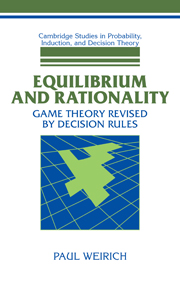7 - Applications
Published online by Cambridge University Press: 18 March 2010
Summary
Let us now apply our search procedure for strategic equilibria to various games, first the problem cases for Nash equilibrium presented in Section 3.3, then other cases that bring out the distinctive features of strategic equilibria. Although the standard of strategic equilibrium is much weaker than the standard of Nash equilibrium, it is not empty. It many games it disqualifies some profiles as solutions.
The applications serve mainly to illustrate strategic equilibrium and the search procedure. But they also provide a test of our equilibrium standard. No genuine solution should fail to meet the equilibrium standard. The standard should not disqualify any profile that counts as a solution on firm intuitive grounds or according to firm independent standards for solutions. The applications verify that our equilibrium standard rejects only nonsolutions.
RETURN TO THE PROBLEM CASES
Our equilibrium standard for solutions applies to a concrete game – in the case of a normal-form game, a realization of a payoff matrix. To apply the standard, we construct the complete version of a concrete game and use our search procedure to identify equilibria, assuming that the games treated meet the restrictions Chapter 6 imposes on applications of our search procedure. We typically construct examples starting with a payoff matrix for an ideal normal-form game. Then we introduce the game's partial version, and afterward its complete version, which together provide an account of pursuit of incentives. We construct examples so that group paths conform with the interagent selection and stopping rules, and we generally assume that they conform with all other rules of jointly rational pursuit of incentives.
- Type
- Chapter
- Information
- Equilibrium and RationalityGame Theory Revised by Decision Rules, pp. 191 - 210Publisher: Cambridge University PressPrint publication year: 1998



